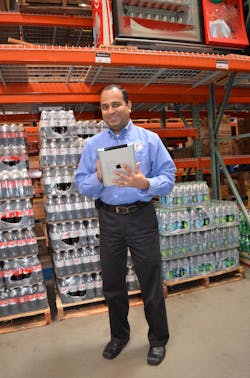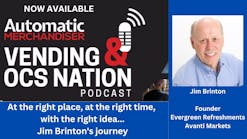The Sample Bag: Don’t Let Personal Preferences Influence Your Decision
It seems every broker and manufacturer representative brings along with them a sample bag filled with product they represent. While surely no one is opposed to free stuff, especially when it comes to food, operators need to be conscious of the reasons product samples are brought into the office in the first place. Product samples are effective at enticing operators to purchase and stock the represented products. However, operators cannot let their personal tastes and preferences determine what they purchase from brokers and manufacturers.
For this reason, we had strict rules at my vending company against sampling products brought in by the brokers; we did not want samples to influence our purchasing decision or give an impression that they did. When we held monthly broker meetings, we accepted all the samples, but we did not allow anyone to open a package or sample any item in that meeting.
We reassured the brokers that we did not make purchasing decisions willy-nilly; rather we put much consideration into product selection and evaluated each product fairly and on all its merits relative to our needs. After this, they truly became our partner and many offered us valuable insights, sometimes even if it was not in the interest of their product being considered. We learned to trust each other.
Although we would still eat product afterwards and pass samples to route drivers, office workers and other employees, we did not want any of our staff to be confused about the distinct business needs of purchasing and stocking items relative to personal likes and dislikes.
Quite simply none of our employees represented every demographic group or segment of the consumer base. In the end, it doesn’t matter what we like, it only matters what our customers buy.
Some may say that sampling is a proxy for gaining insights into what customers may like. However, I would argue that more often than not, our personal bias unfairly impacts our decisions. And if we don’t want our drivers to stock machines based on what they like and dislike, we should not be making purchasing decisions based on what we like and dislike.
Taste is only one aspect of the “product”. For example, packaging makes a significant difference as well. If you think about it, it is perhaps even more important than taste because in a vending machine, people actually will make the product purchase decision based on how the product looks through the glass, not how it tastes (although taste certainly affects repeat business as well as word-of-mouth).
Price, place (distribution) and promotion also impact how well a product performs. When we rely on sampling, we put all the weight of the decision on the taste of the product. Successful marketers can take a mediocre product and make a star out of it. Likewise, a “great tasting” product can fail miserably due to poor marketing.
And if that’s still not convincing enough, factors besides marketing impact product performance. Brand loyalty, social influence, past performance of similar products, geography, current events and weather can all have an impact on how well a product sells. In all, there are simply too many factors to enumerate and evaluate. Even the best developed, well marketed and most liked products (in focus groups) can fail.
At the end of the day, what matters to the operator is that customers purchase the product. In a future blog post, I’ll write about some factors that we considered in product selection.

Paresh Patel
Paresh Patel, PhD, is an award-winning innovator who has designed and developed products that have won five NAMA gold innovation awards, a Connected World award and an American Beverage Association award for Best Technology Innovation. He's an operator who has experienced the challenges faced by operators and developed products that solve real problems in unique ways. He can be reached at [email protected].





